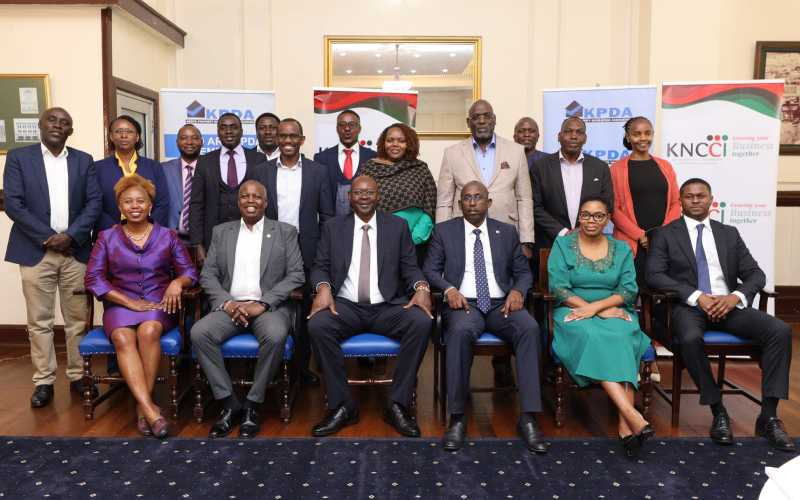The Kenya Property Developers Association (KPDA) has signed a strategic partnership with the Kenya National Chamber of Commerce and Industry (KNCCI) to unlock new financing models that address affordable housing challenges and promote sustainable urban development.
KPDA plans to leverage its members’ technical expertise, practical experience, and understanding of on-the-ground issues in collaboration with KNCCI, which serves as the umbrella business organisation in Kenya. This partnership aims to expand the national reach, amplify advocacy for policy reforms, and leverage the broad networks that KNCCI maintains across various sectors of Kenya’s economy.
“From streamlining approval processes, advocating for consistent policies, and creating a stable environment that attracts investment, we will move from fragmented requests to coordinated advocacy,” said KPDA Chairman Ken Luusa.
According to KNCCI, the real estate sector contributes approximately 10% of Kenya’s GDP and ranks as one of the fastest-growing industries in the country. With 22% of Kenyans living in urban areas and the urban population expanding at an annual rate of 4.2%, Nairobi is recognized among the top five fastest-growing real estate markets in Africa.
Follow The Standard
channel
on WhatsApp
Kenya currently faces a substantial housing deficit. While about 200,000 new housing units are required yearly to meet demand, only 50,000 units are being constructed, resulting in an annual shortfall of 150,000 homes. This imbalance has led to housing prices doubling since 2004.
“Increased construction activity can become an important source of revenue through processing permits, approvals, and related activities. Affordable housing remains a key government priority under the Kenya Vision 2030 and the Big Four Agenda. The rising urban demand—especially in Nairobi, Mombasa, Kisumu, and Nakuru—is driving growth in gated communities, apartments, and mixed-use developments,” said KNCCI President Dr. Eric Rutto.
He further emphasised the labour-intensive nature of construction, noting that every housing unit built creates between three and five jobs. Nairobi’s status as a regional hub for multinational corporations, banks, and tech firms continues to spur demand for office space. However, an oversupply of high-end offices has softened the market, leading tenants to prefer flexible leasing options and co-working spaces.
Dr. Rutto also highlighted growth in retail space, citing expanding shopping malls including Two Rivers, Westgate, Garden City, and Sarit Centre, which are enhancing Nairobi’s retail culture.
Additionally, the growth of e-commerce and manufacturing sectors has increased demand for modern warehouses and logistics hubs in industrial zones such as Athi River, Tatu City, Ruiru, and Naivasha. This development is further supported by major infrastructure projects like the Standard Gauge Railway and Nairobi Expressway.
This partnership between KPDA and KNCCI aims to unlock opportunities that will accelerate financing, policy advocacy, and innovation to bridge Kenya’s housing gap and foster sustainable urban growth.
Follow The Standard
channel
on WhatsApp
The Kenya Property Developers Association (KPDA) has signed a strategic partnership with the Kenya National Chamber of Commerce and Industry (KNCCI) to unlock new financing models that address affordable housing challenges and promote sustainable urban development.
KPDA plans to leverage its members’ technical expertise, practical experience, and understanding of on-the-ground issues in collaboration with KNCCI, which serves as the umbrella business organisation in Kenya. This partnership aims to expand the national reach, amplify advocacy for policy reforms, and leverage the broad networks that KNCCI maintains across various sectors of Kenya’s economy.
“From streamlining approval processes, advocating for consistent policies, and creating a stable environment that attracts investment, we will move from fragmented requests to coordinated advocacy,” said KPDA Chairman Ken Luusa.
According to KNCCI, the real estate sector contributes approximately 10% of Kenya’s GDP and ranks as one of the fastest-growing industries in the country. With 22% of Kenyans living in urban areas and the urban population expanding at an annual rate of 4.2%, Nairobi is recognized among the top five fastest-growing real estate markets in Africa.
Follow The Standard
channel
on WhatsApp
Kenya currently faces a substantial housing deficit. While about 200,000 new housing units are required yearly to meet demand, only 50,000 units are being constructed, resulting in an annual shortfall of 150,000 homes. This imbalance has led to housing prices doubling since 2004.
“Increased construction activity can become an important source of revenue through processing permits, approvals, and related activities. Affordable housing remains a key government priority under the Kenya Vision 2030 and the Big Four Agenda. The rising urban demand—especially in Nairobi, Mombasa, Kisumu, and Nakuru—is driving growth in gated communities, apartments, and mixed-use developments,” said KNCCI President Dr. Eric Rutto.
He further emphasised the labour-intensive nature of construction, noting that every housing unit built creates between three and five jobs. Nairobi’s status as a regional hub for multinational corporations, banks, and tech firms continues to spur demand for office space. However, an oversupply of high-end offices has softened the market, leading tenants to prefer flexible leasing options and co-working spaces.
Dr. Rutto also highlighted growth in retail space, citing expanding shopping malls including Two Rivers, Westgate, Garden City, and Sarit Centre, which are enhancing Nairobi’s retail culture.
Additionally, the growth of e-commerce and manufacturing sectors has increased demand for modern warehouses and logistics hubs in industrial zones such as Athi River, Tatu City, Ruiru, and Naivasha. This development is further supported by major infrastructure projects like the Standard Gauge Railway and Nairobi Expressway.
This partnership between KPDA and KNCCI aims to unlock opportunities that will accelerate financing, policy advocacy, and innovation to bridge Kenya’s housing gap and foster sustainable urban growth.
Follow The Standard
channel
on WhatsApp
By Winfrey Owino


